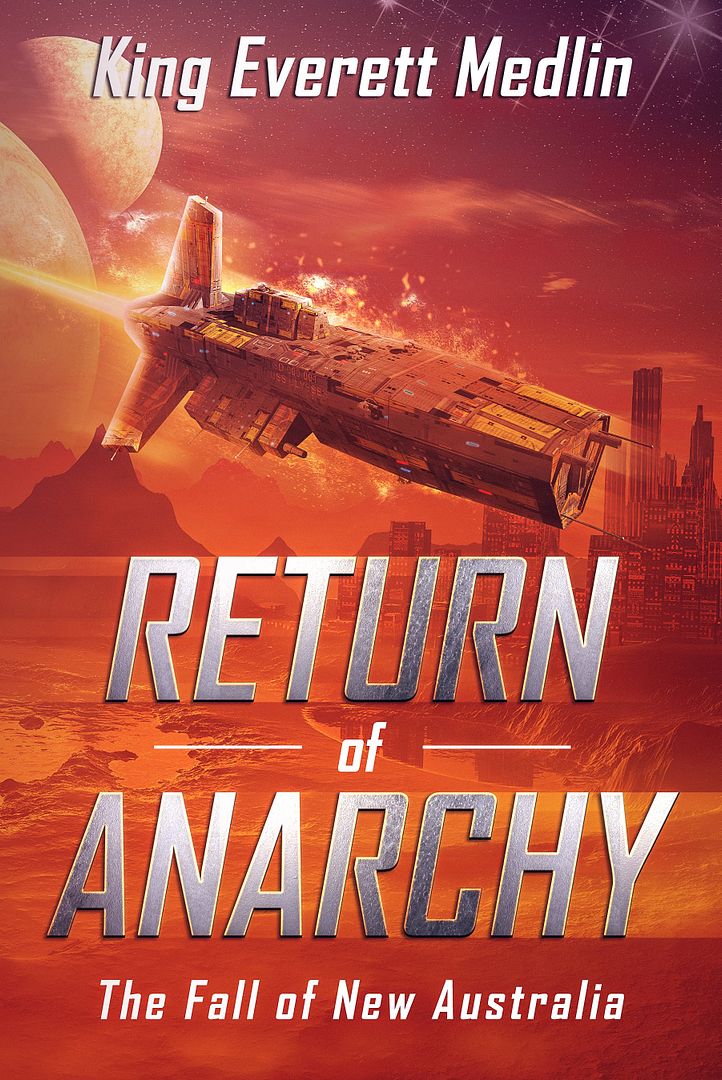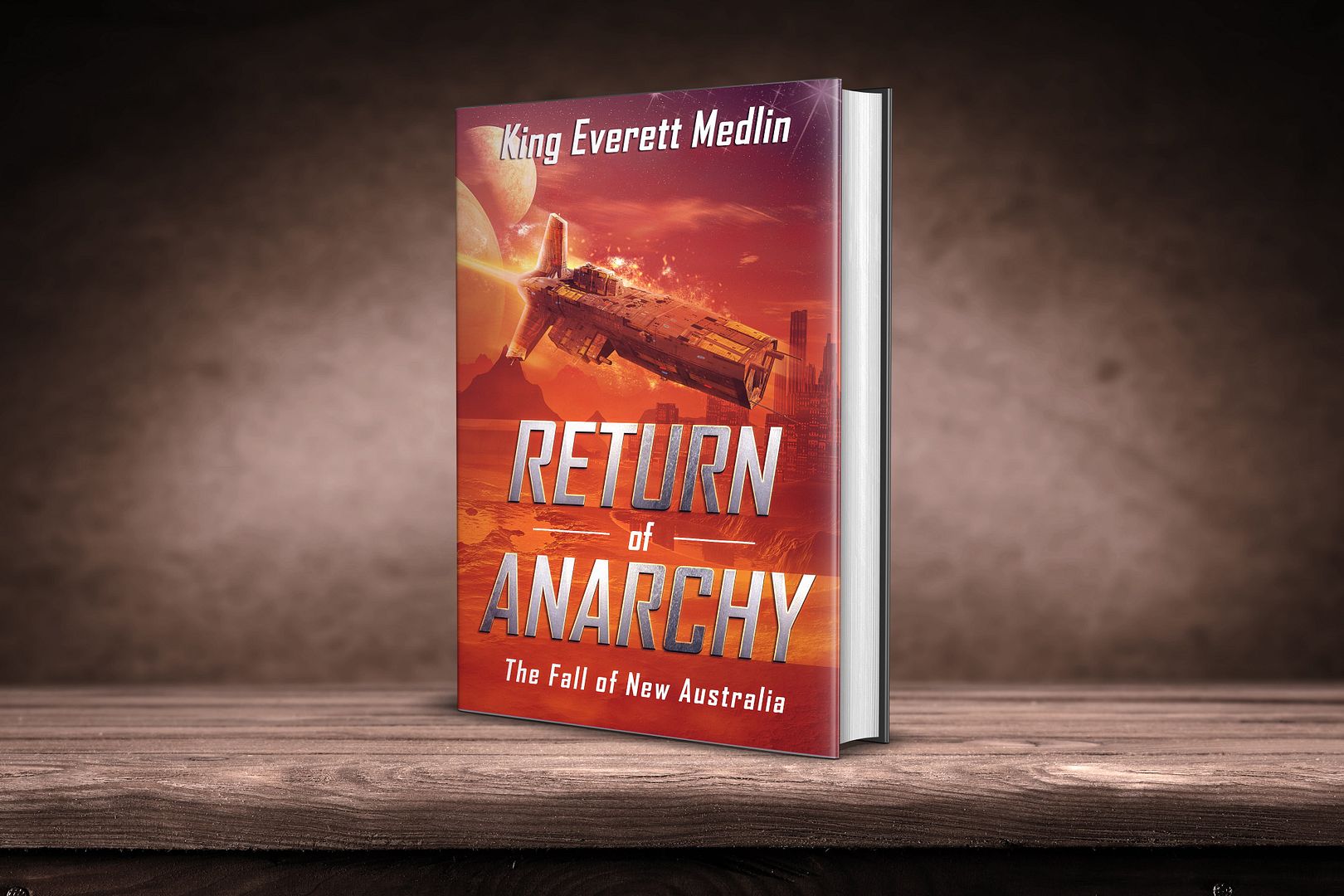EXCERPT
From Chapter One, THE PORTAL:
“Mr. Brilly … do we have confirmation yet?”
Admiral Slout Epydidimus had just returned to the command bridge and was seated in his captain’s chair onboard the Naustie flagship Anarchy. This had been specially made for him after the former freighter had been captured following the riot at New Australia Planetary Prison. Originally designed for humans – and with Admiral Snout being a pig-like Suidonji – it had to be altered to accommodate his form. He was addressing Ensign Frilbriliram who had been awaiting word as to whether the ship’s science officer had given the green light.
His science team had been working nonstop for the past twenty hours. They’d studied the area and discovered conditions were right for the existence of a wormhole, a space anomaly that most considered theoretical at best. The idea of actually travelling through one had been routinely dismissed over the centuries. The concept of a ‘space portal’ was an old one; and to ship captains more legend than reality. A thousand years ago wormholes had been proposed by a revered scientist back on Earth. That being said, few outside the literary community ever imagined one being traversed.
Not knowing how far behind their pursuers were; not to mention whether the enemy were gaining on them, the only option seemed to be in taking a detour, even though they’d taken one already and it had cost them. Landing on Kapteyn B had been necessary of course. They’d had to offload female prisoners from the Chengshi. Jettisoning them into space was not something Admiral Slout was willing to do. Changing direction wouldn’t cut it – they were being tracked and had been for quite some time. Once within firing range they’d be obliterated. It was preferable to find some way to conceal their location for a time. Disappearing inside of a wormhole – at least to Admiral Slout and his command staff – sounded immensely appealing. Not that Minggatu didn’t have a point.
True, the ship’s spectrometer had picked up on the anomaly; but that shouldn’t have seemed unusual. They’d been running for their lives for some time now; had activated their warheads in order to provide extra speed – thus setting up a harmonic field which caused a subspace field to be generated. This had illuminated a corridor and the spectrometer had identified a passage parallel to the ship. Minggatu, a soft-spoken Mongolian, tried explaining this when it had first occurred. Admiral Slout only heard what he wanted to hear; especially when his first officer alerted him to the opportunity. Did they have the technology to “open the door” and thus “disappear” entirely? That’s all he’d wanted to know. If successful – if they truly could burrow through the fabric of space and survive to the other side – the Interplanetary Fleet would have no idea where they’d gone. Minggatu thought it to be foolhardy.
“Admiral, you need to realize – or do you already know just how risky this would be? We won’t have any idea what’s on the other side. Even if we can force it open … even if we do manage to keep it open long enough to pass through. You know this, right?” That’s how he’d explained himself – trying not to be insubordinate, yet being as honest as he possibly could.
“A wormhole, just so we’re understanding each other, they’re only theoretical – a passage through space-time that supposedly creates a shortcut between two points in the universe. Yes, they’re predicted by the theory of general relativity but nothing more. Predicted; not verified. And according to Einstein-Rosen theory there is serious danger of collapse, not to mention high radiation.”
Slout did not interrupt. He’d learned when it came to subordinates expressing expert opinions that it was wiser to let them speak their minds. If they rattled on long enough they’d often end up talking themselves into whatever was proposed. That was always best. Minggatu had plenty to say.
“The first problem is size, sir. You see, primordial wormholes are predicted to exist on microscopic levels – centimeters wide at the most. Sure, as the universe has evolved, it is possible – remotely possible mind you – that some may have grown. The universe is constantly expanding. But the main issue is stability. Even Einstein himself never considered them as a means of traveling from one galaxy to another because they collapse quickly. That is, we believe they do.”
But that’s where Slout had him. It was merely a matter of making the argument that the Anarchy’s warp drive was predicated on the creation of non-baryonic matter. He too knew a thing or two about interstellar travel. Had to. He’d been a ship’s captain for many years; was a smuggler before he was sent to prison. Offered a “deal” if he’d identify the mobsters he was working for, he’d wisely chosen ten years at New Australia Planetary Prison rather than cooperating with investigators. If only he would have, he might have gotten off with a suspended sentence but Slout was too smart. The mob would have killed him for doing something like that.
“Yes,” the admiral replied, pretending to be ill-informed. “I’ve heard of this. We would need some form of exotic matter, I believe it’s called, in order to hold it open long enough for us to pass through.”
“That’s right, Admiral. You were told correctly,” Minggatu observed. “And it’s not clear whether such a thing exists in great enough quantity within the natural realm. True, it could work in keeping the portal open while traversing one end to the other, but ….”
“But what?” said the ship captain. He could sense that his science officer knew the answer. The trick was in getting him to admit it.
“Well, sir, it’s just that such matter … exotic matter … has only been discovered while in certain vacuum states as part of quantum theory. Those experiments are – I mean they’ve only been conducted in a controlled laboratory environment.”
Slout decided it was time to turn the screws. What had always been believed – though never attempted in space – was that exotic matter contained negative energy density and large negative pressure. If it could be “created” in a lab, why couldn’t it be done now using the same technology they already had onboard?
“I see. And do we not have a laboratory onboard this ship?” asked Slout. “Do we not already have the necessary facilities to accomplish this?”
“Accomplish what, Admiral?” asked Minggatu; being extra careful not to sound flippant. The ship’s commander wasn’t just his superior officer; he was also a massive Suidonji, fully capable of snapping the man’s neck if he wanted to. Still, he could sense what his commander was driving at and it made him terribly uneasy. Slout, for his part, was done playing cat and mouse with the disgraced former college professor. What the little fellow really needed was to see the bigger picture; and Slout was happy to enlighten him. After a pause he stood up from the small table they were seated at and snorted menacingly, placing his front hooves on the surface and glaring at him.
“Perhaps it is me who should be doing the explaining. We’re being chased, Minggatu … and by a force fully capable of not only destroying us but everyone – every living soul on New Australia. It is what it is, but you need to understand just what’s at stake here. We’ve been running from the IPF for quite some time – and to be honest, we may never see our home planet again. But if we can elude them long enough, who knows what could happen? All we know is that we’re alive today … and you, my friend, can see to it we’re still that way tomorrow.”
He then grinned his typical grin – it looked more like a smirk. Not well-known for his humor he raised a thick eyebrow and waited for the science officer’s response. Like any good leader he knew when he’d made his point; what’s more he knew when to stop talking and let his subordinate process what had been said. Say too much and it allowed time for devising a comeback. Say just enough – make it clear what was required of the man – that’s all he wished to do. Either way it was a direct order he was giving; whether implied or stated.
“Figure it out,” he added, in order to remove all doubt what he was demanding. This he did while raising up and placing his hooves on his hips. Minggatu realized this meant it was the end of the meeting. Slout was done with him for now. He’d either produce the results they needed in order to escape through the wormhole or die right along with the rest of his fellow crewmen. Might be days – weeks – hours later once the Interplanetary Fleet caught up with them; but they would.
“Yes Admiral,” was all he said in reply.







thanks for hosting
Glad to help.